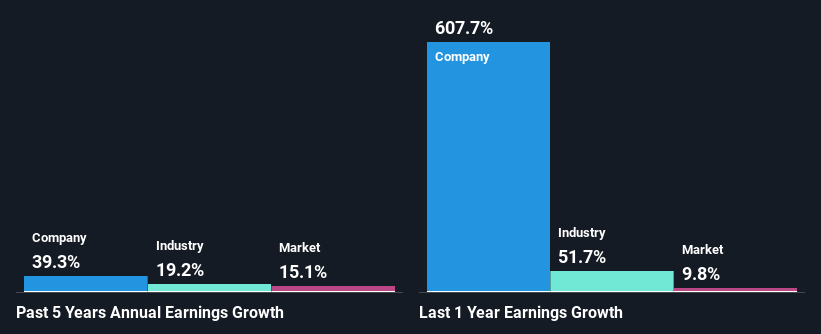- Saudi Arabia
- /
- Insurance
- /
- SASE:8300
Will Weakness in Wataniya Insurance Company's (TADAWUL:8300) Stock Prove Temporary Given Strong Fundamentals?

With its stock down 20% over the past three months, it is easy to disregard Wataniya Insurance (TADAWUL:8300). But if you pay close attention, you might gather that its strong financials could mean that the stock could potentially see an increase in value in the long-term, given how markets usually reward companies with good financial health. Specifically, we decided to study Wataniya Insurance's ROE in this article.
Return on equity or ROE is an important factor to be considered by a shareholder because it tells them how effectively their capital is being reinvested. In short, ROE shows the profit each dollar generates with respect to its shareholder investments.
View our latest analysis for Wataniya Insurance
How Do You Calculate Return On Equity?
The formula for return on equity is:
Return on Equity = Net Profit (from continuing operations) ÷ Shareholders' Equity
So, based on the above formula, the ROE for Wataniya Insurance is:
22% = ر.س121m ÷ ر.س544m (Based on the trailing twelve months to June 2024).
The 'return' is the profit over the last twelve months. One way to conceptualize this is that for each SAR1 of shareholders' capital it has, the company made SAR0.22 in profit.
What Has ROE Got To Do With Earnings Growth?
Thus far, we have learned that ROE measures how efficiently a company is generating its profits. We now need to evaluate how much profit the company reinvests or "retains" for future growth which then gives us an idea about the growth potential of the company. Assuming all else is equal, companies that have both a higher return on equity and higher profit retention are usually the ones that have a higher growth rate when compared to companies that don't have the same features.
A Side By Side comparison of Wataniya Insurance's Earnings Growth And 22% ROE
On the face of it, Wataniya Insurance's ROE is not much to talk about. However, the fact that the company's ROE is higher than the average industry ROE of 11%, is definitely interesting. Even more so after seeing Wataniya Insurance's exceptional 39% net income growth over the past five years. That being said, the company does have a slightly low ROE to begin with, just that it is higher than the industry average. So, there might well be other reasons for the earnings to grow. Such as- high earnings retention or the company belonging to a high growth industry.
Next, on comparing with the industry net income growth, we found that Wataniya Insurance's growth is quite high when compared to the industry average growth of 19% in the same period, which is great to see.

Earnings growth is a huge factor in stock valuation. The investor should try to establish if the expected growth or decline in earnings, whichever the case may be, is priced in. Doing so will help them establish if the stock's future looks promising or ominous. One good indicator of expected earnings growth is the P/E ratio which determines the price the market is willing to pay for a stock based on its earnings prospects. So, you may want to check if Wataniya Insurance is trading on a high P/E or a low P/E, relative to its industry.
Is Wataniya Insurance Making Efficient Use Of Its Profits?
Given that Wataniya Insurance doesn't pay any regular dividends to its shareholders, we infer that the company has been reinvesting all of its profits to grow its business.
Summary
In total, we are pretty happy with Wataniya Insurance's performance. Specifically, we like that it has been reinvesting a high portion of its profits at a moderate rate of return, resulting in earnings expansion.
Valuation is complex, but we're here to simplify it.
Discover if Wataniya Insurance might be undervalued or overvalued with our detailed analysis, featuring fair value estimates, potential risks, dividends, insider trades, and its financial condition.
Access Free AnalysisHave feedback on this article? Concerned about the content? Get in touch with us directly. Alternatively, email editorial-team (at) simplywallst.com.
This article by Simply Wall St is general in nature. We provide commentary based on historical data and analyst forecasts only using an unbiased methodology and our articles are not intended to be financial advice. It does not constitute a recommendation to buy or sell any stock, and does not take account of your objectives, or your financial situation. We aim to bring you long-term focused analysis driven by fundamental data. Note that our analysis may not factor in the latest price-sensitive company announcements or qualitative material. Simply Wall St has no position in any stocks mentioned.
About SASE:8300
Wataniya Insurance
Provides a range of insurance products and services in the Kingdom of Saudi Arabia.
Flawless balance sheet with solid track record.


